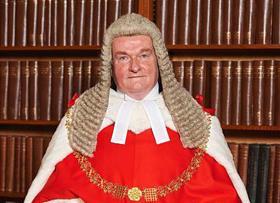Tackling the 'stubbornly low' number of female partners in large law firms along with under representation of people from minority ethnic communities in senior roles is the key to creating a judiciary more representative of society as a whole, the lord chief justice said last night.

In a lecture ‘A changing judiciary in a modern age’, the Lord Burnett of Maldon said that it was inevitable that the judiciary reflected society as it was several decades ago, when current judges completed their education, rather than today. He noted that, since 1991, the ethnic minority population of the UK has increased from 5.5% of the total to 14%. 'A bare comparison between the proportion of ethnic minority judges and the current overall ethnic minority population will not take these factors into account.'
He also revealed that, until the 1990s, the Lord Chancellor's Department - then responsible for judicial appointments - had a policy against picking openly homosexual judges. This was ended by Lord Mackay of Clashfern in 1991, the lord chief justice said.
However the removal of outright barriers does not in itself create a more diverse judiciary, Lord Burnett said, noting the 'painfully and disappointingly slow' progress of women in the century since the Sex Disqualification (Removal) Act. For this, he indicated, the profession itself is to blame. 'For various reasons... the structure and practices of the legal profession from which the judiciary is drawn have not resulted in the diversity that all would like to see,' he said. 'The number of female partners in the larger solicitors' firms and the number of female senior juniors and QCs at the bar remains stubbornly low.'
Likewise, while about 20% of practising solicitors are from ethnic minorities, the partnership figures are 'striking'. In single-partner firms 34% of partners are from ethnic minorities; in large firms the figure drops to 8%.
However Lord Burnett denied the need for more external encouragement on the Judicial Appointments Commission to recommend diverse candidates. 'My secpticism about targets extends to principled opposition to quotas,' he said. 'They are not compatible with appointment on merit nor, ultimately in sustaining public confidence in the judiciary.'
Instead, he suggested that the solution might lie in changes to working practices in the professions and the judiciary, helped by new technology to create a culture that is 'supportive of all'. He also revealed that he had noticed recent reports of sexism faced by women at the criminal bar. 'I have little doubt that this is a significant feature which needs further investigation and consideration, both by the professions and the judiciary.'



























18 Readers' comments